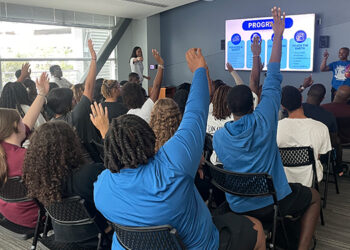The Ohio State University’s campus recreation department’s motto is “Life in Motion.” According to Jenna Patterson, the community programs coordinator at OSU, that motto is lived out by providing the university and surrounding community a “life full of physical and wellness activities.”
The inclusivity includes an adaptive athletes program, offered to both the campus and to the community. OSU’s Adapted Recreational Sports Program (ARS) started in the early 1980s, between recreational sports and the office of disability services.
The Adaptive Recreational Services Program at OSU has three specific areas of focus: accommodations, youth instructional programs and customized programs. “We are very intentional with the programs that we offer in that we offer in the we understand a lot of the participants we see have different needs than our typically-developing participants,” said Patterson.
While Patterson admits there is a lot more that goes into an ARS program than campus recreational professionals may realize, she said many departments might already be unknowingly providing accommodation and inclusion plans.
“Start small and work your way up to your dream programs,” said Patterson. “There are many barriers that we face in higher education, related to the stigma surrounding disability. This specific community is one that is extremely difficult to reach do to the lack of disclosure. Having a great relationship with Disability Services and other similar professionals is essential.”
The University of Central Florida makes a point to cater to every student, no matter his or her unique needs. At the Recreation and Wellness Center, both a professional staff member and student staff member focus solely on the Adaptive Recreation Program.
“Several years back, we began to help students who needed some assistance with working out on the fitness floor and developed the Student Assisted Workout Program, also known as SAW. That program has continued to grow and develop,” explained James Wilkening, the director of the recreation and wellness center at UCF.
According to Andrea Snead, the coordinator for sport clubs and adaptive recreation at UCF, partnerships are key. The university has partnered with the Orlando Magic Wheels, the Orange County Clash Cross Country Team and the Special Olympics.
“Don’t stick within your campus,” added Snead. “Go out and branch out to those communities. With partnering with the Special Olympics, they have something called unified basketball and unified sports, which is a partnering of students with and without intellectual disabilities. It really brings a different level of competition to the sports that you already have.”
In addition to partnerships, the University of Central Florida organizes many unique games available for able-bodied students and students with disabilities. Those games include quad rugby, which Snead described as rugby in wheelchairs on a basketball court and goalball, which is a spin-off of soccer for the visually impaired. Each of these games is scaled for able-bodied students to play.
When starting an adaptive program at colleges, Patterson advises university recreation departments first understand what their needs are, then begin conversations with other programs on campus.
“As recreational sports departments, we are here to serve our community; however that may look, so we need to first assess its needs. Once you have an idea of what those needs are, you can determine what that mean within the context of your department’s mission, vision and values and how that manifests in the practical settings,” said Patterson.










